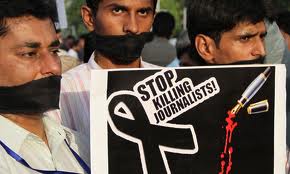
Karachi, Jan 14: That the judicial commission’s report on Saleem Shahzad’s murder is inconclusive should not be surprising, experts say. Its shortcoming lies in its very foundation – the formation of a ‘judicial panel’ to investigate a murder.
The judicial commission’s failure to point out the murderers of journalist Saleem Shahzad was expected, said Coordinator of the Committee to Protect Journalists’ Asia Programme Bob Dietz.
“I know a lot of journalists had pressed for the judicial panel, but the report now clearly shows that it hasn’t been able to serve its purpose of pointing out the murderers,” Dietz said while speaking to The Express Tribune via phone.
The judicial panel shouldn’t have been tasked with uncovering the murderers of Saleem, simply because this required expertise that they didn’t possess to begin with, Dietz said.
“This is basically the job of the police who are trained to investigate murder cases. In fact it is only because of the inability of the police and the government to uncover the truth that the panel was entrusted with this job,” he said.
Dietz suggested the case should have been investigated by a panel similar to the one that had been formed in the aftermath of Daniel Pearl’s murder in Karachi. “In Daniel’s case, real police work was done by experts in their fields. This led to the arrest of several suspects and eventually some of them were sentenced and sent to jails.”
When asked what was the way forward if the police investigators were vary of probing into a case that allegedly involved senior intelligence agency officials, Dietz proposed that then the media itself would have to do the job of exposing the murderers.
Senior Analyst Mazhar Abbas said he found the report “interesting” and recommended all journalists to go through it “from an academic point of view.”
Abbas pointed out a number of missing links in the commission’s report. For example, he says, the IGP Islamabad’s testimony has not been included in the report to clarify the important point about how Saleem’s vehicle was able to move out of Islamabad all the way to Jhelum without anyone in the police taking notice: “When Saleem was reported kidnapped, did the police pass on a message on their wireless control system about the disappearance?”
Also, he said, that while the commission leaves the door open about the motive and people involved in the incident, it is clear that normally militant groups claim responsibility for their attacks.
“If even for the sake of argument we assume that the Ilyas Kashmiri group was behind the murder [as stated as one of possibilities in the report], then what was stopping them from claiming the attack on Saleem,” he asked.
Pulitzer prize winning author Dexter Filkins, who had written an article in The New Yorker about Shahzad’s death titled “The Journalist and the Spies”, stood by the revelations he had made in his article.
In his piece, Filkins not only connected the dots between Shehzad’s death and militant commander Ilyas Kashmiri’s killing in a drone attack, but also spoke of senior American officials, who alleged that the orders to kill Shahzad came directly from the top army brass.
When asked to comment on the commission’s report, Dexter said in an email: “I’m going to let my article speak for itself.”
ISI’s Brigadier Zahid Mehmood Khan, in his written testimony to the commission mentioned in the report, had lambasted Filkins for his piece.
Published in The Express Tribune with the International Herald Tribune, January 14th, 2012.


I frankly knew about much of this, but however, I still thought it had been valuable. Beautiful job!